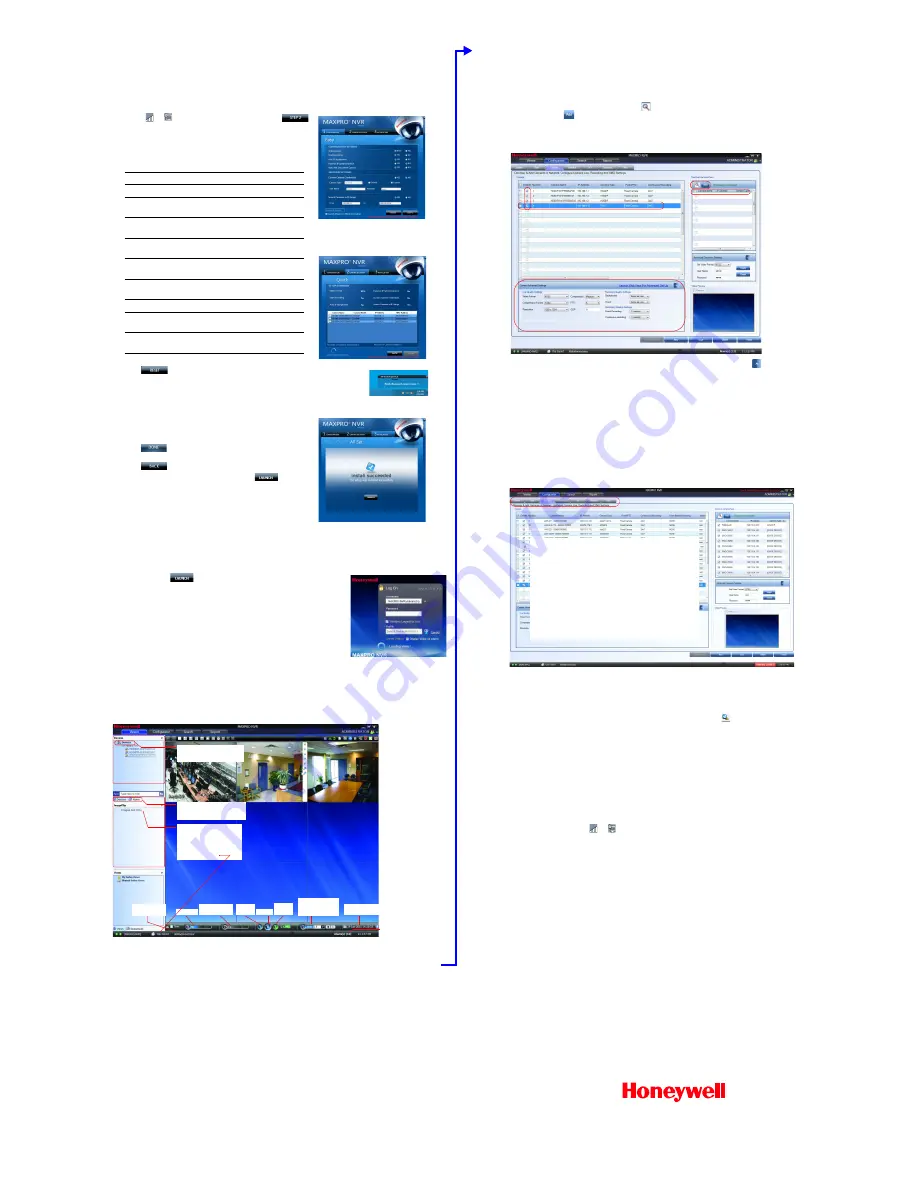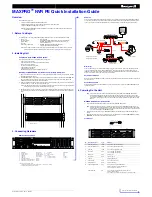
www.honeywellvideo.com
+1.800.796.CCTV (North America only)
Document 800-12139 – Rev A – 06/2012
MAXPRO
®
NVR PE Quick Installation Guide
© 2012 Honeywell International Inc. All rights reserved. No part of this publication may be reproduced by any means without written
permission from Honeywell. The information in this publication is believed to be accurate in all respects. However, Honeywell cannot
assume responsibility for any consequences resulting from the use thereof. The information contained herein is subject to change
without notice. Revisions or new editions to this publication may be issued to incorporate such changes.
5. Honeywell IP Camera Configuration
Using the MAXPRO NVR Wizard (3 Clicks to Live Video)
The setup wizard starts automatically after you log on (this can take up
to two minutes).
1. The
CONFIGURATION
page is displayed. When the network is
ready (
or
appears in the notification area), click
to accept the default settings and proceed to CAMERA
DISCOVERY.
To modify the settings for your unique system requirements, refer
to the table below. (After initial setup, you can do this in the
MAXPRO NVR client.)
Click
to reset the values without saving any changes.
2. The
CAMERA DISCOVERY
page is displayed. Each newly
connected camera is identified and an IP address is assigned to
the camera by the Wizard, after which the camera reboots.
It may take a few minutes before the cameras are discovered and
added. You will see a
Discovery in progress…
indicator in
addition to a pop-up message on the lower right of your monitor.
The list disappears as the cameras are added to the MAXPRO
NVR.
Click
only after all connected cameras are discovered
and added.
Click
to return to the CONFIGURATION page.
3. The
INSTALLATION
page is displayed. Click
to start the
MAXPRO NVR application (see 3 Live View).
Note
To add non-Honeywell devices, see
7. Third-Party Device
Configuration
.
6. Live View
Log On to the MAXPRO NVR Viewer
1. When you click
in the Setup Wizard, the
Log On
dialog box appears.
Please wait while the system logs you on automatically as a Windows Logged-
In User.
2. MAXPRO NVR launches and the Viewer tab appears (see below). The
Devices
area in the left pane lists all of the discovered network cameras.
View Live Video
To view video from cameras, double-click
MAXPRO NVR
in the
Devices
list to
display video from all discovered cameras in the Viewer. You can also highlight
and drag each camera into a panel.
Note
For continuous monitoring of live video, it is recommended that you use a remote client workstation.
You can install a remote client using the installation software contained on the software and documentation
DVD included with your unit. Select
Client Installation
as the Installation Type during setup. For more
details, refer to the
MAXPRO
®
NVR Commissioning and Installation Guide
.
Field
Description
Video Format
NTSC, PAL
Start Recording
Start recording as soon as the camera
is added in MAXPRO NVR.
Auto IP Assignment
Software assigns IP address
automatically.
Dynamic IP
Synchronization
Software synchronizes any change in
a device’s IP address.
Auto Add
Discovered Camera
Any newly connected device is
automatically added to the device list.
Custom Camera
Credentials
Not configurable in the Wizard.
Camera Type
Not configurable in the Wizard.
Username,
Password
Not configurable in the Wizard.
Camera IP Range
The system automatically detects all
cameras in this range on the network.
STEP 1: CONFIGURATION
STEP 2: CAMERA DISCOVERY
STEP 3: INSTALLATION
Pop-up
message
List of Honeywell IP cameras
connected to and discovered
by MAXPRO NVR.
Devices tab: Currently active.
Alarms tab: Acknowledge and
clear alarms.
Images/Clips: Select images
and clips to view.
Double-click or drag the clip
to a Viewer panel to view.
To export a clip for forensics,
click
Clip Export
.
Number of alarms detected
Timeline
User currently
logged on
Change
playing speed
Play in
reverse Pause
Play
forward
Select date and time
to start recording
Time jump control
to quickly locate
video
7. Third-Party Device Configuration
Non-Honeywell devices are configured using the MAXPRO NVR software. To set up cameras for video input:
1. Launch MAXPRO NVR.
2. On the
Configurator
tab, click the
Camera
tab.
3. In the
Discover cameras here
area, click
to discover the connected cameras in the subnet,
and then click
to add a camera to the
Camera
list.
4. In the
Camera
list, ensure that the
Enable
check box is selected for the camera(s) that you have added and that the
user name and password that appears on the screen matches the user name and password of the camera. The user
names and passwords must match for the MAXPRO NVR PE unit to connect and stream video.
5. To change the default parameters of a camera, select the camera, and then click
next to
Advanced
Discovery Settings
to open an advanced settings pane where you can modify the settings as required.
6. Click
Save
for your new settings to take effect.
8. Advanced Features
Note
For more detailed information on the advanced features available in MAXPRO NVR PE, please refer to the
comprehensive guides available in the UserManuals folder on the software and documentation DVD.
Configurator Tab
Use the
Configurator
tab to configure video devices and set up your MAXPRO NVR PE system. The
Configurator
tab
consists of seven sub-tabs:
System
,
Disk
,
Camera
,
Schedule
,
I/O
,
Sequence
,
User
.
Search Tab
Use the
Search
tab to search for recorded video (clips) or events.
1. Select the check box next to the camera(s) from which the video was recorded.
2. Select search conditions in the Date time filter, and then click
Search
(
).
9. MAXPRO NVR PE Default IP Addresses
Your MAXPRO NVR PE unit has two configured network ports with the following default IP addresses:
•
192.168.1.101
for NIC1 (Camera Network)
•
172.25.254.101
for NIC2 (Client Workstation Network)
If more than one MAXPRO NVR PE unit is on the same network, it is recommended that you assign a unique IP address
and computer name to each unit (the default name is
MAXPRO-NVR
).
To change the IP address
1. Click the network icon (
or
) in the notification area, click
Open Network and Sharing Center
, and then
click
Change adapter settings
.
2. Right-click
Camera Network
or
Client Workstation Network
, and then click
Properties
.
3. Click
Internet Protocol Version 4 (TCP/IPv4)
, and then click
Properties
.
4. Click
Use the following IP address
, and then, in the
IP address
,
Subnet mask
, and
Default gateway
boxes,
type the IP address settings.
5. Click
Use the following DNS server addresses
, and then, in the
Preferred DNS server
and
Alternate DNS
server
boxes, type the addresses of the primary and secondary DNS servers.
To change the computer name
1. Click
Start
, right-click
Computer
, click
Properties
, click
Advanced system settings
, click the
Computer Name
tab, and then click
Change...
2. Under
Computer name
, delete the old computer name, type a new computer name, and then click
OK
. The name
cannot contain spaces or all numbers or any of the following characters: < > ; : " * + = \ | ?. After changing the
computer name, you will be prompted to restart the computer.
3. Navigate to the C:\Program Files\Honeywell\MaxproNVR\TrinityFramework\bin folder, and then double-click
MaxProNVRMachineNameUtility.exe
to open the Maxpro NVR Utility.
4.
The new computer name should automatically appear in the
Machine Name
field. If it does not, enter the name
manually. Click
Update
. The message
Machine Name Updated Successfully
appears when the update is complete.
More Information
For more detailed information than is contained in this guide, please refer to the appropriate user guide located on the
software and documentation DVD, or on the Honeywell product web site at
www.honeywellvideo.com
. For a
comprehensive list of all the third-party devices supported by MAXPRO NVR, please go to Honeywell Open
Technology Alliance (HOTA) at
www.security.honeywell.com/hota/
.
Configurator
tab sub-tabs:
System
: Recording, email, holiday/exceptions for
schedules.
Disk
: Hard drive storage capacity, partitioned.
C: reserved for operating system
D: where the data is stored
Camera
: Discover and add network cameras, live camera
configuration, recording, video motion detection.
Schedule
: Set recording schedules for recorded video.
I/O
: Configure input and output for each camera.
Sequence
: Select a sequence of cameras for live video.
User
: Set user access and permission levels.


